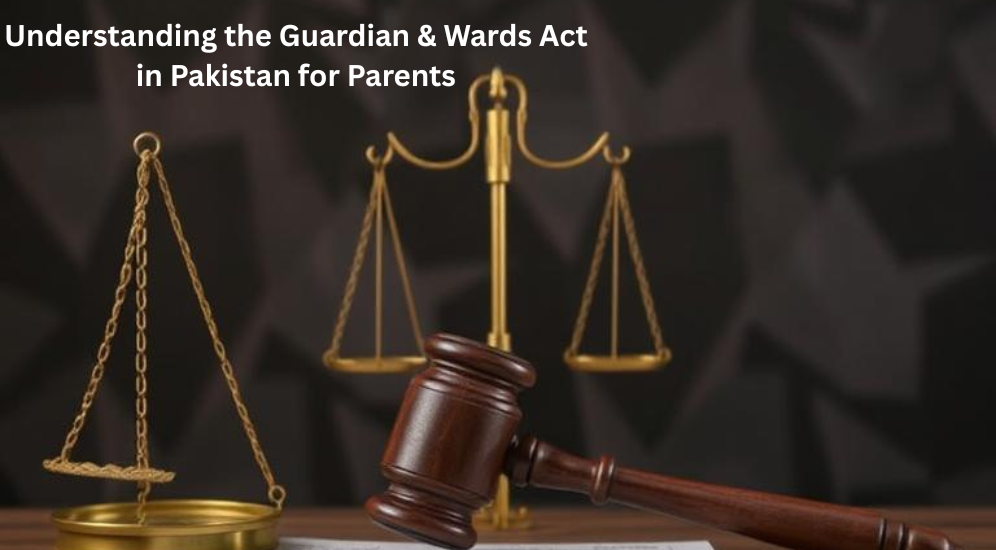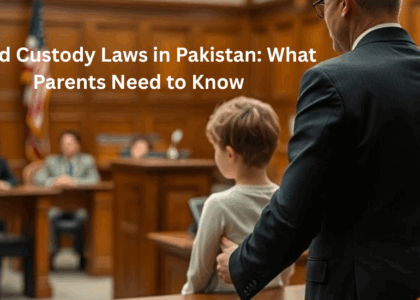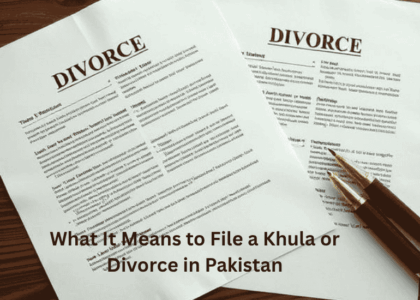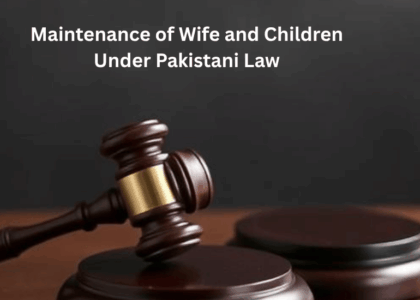Why the Guardian & Wards Act Matters for Parents in Pakistan
The Guardian & Wards Act, 1890, is a key law in Pakistan that governs guardianship and custody matters for children. It ensures that minors, referred to as wards, are cared for by responsible adults when parents are unable or unfit to do so. This law is especially important for families facing disputes, divorce, or the loss of a parent. For parents in Islamabad, understanding this act is crucial to protect their children’s rights and secure their future.
Overview of the Act and Its Relevance to Families
The Guardian & Wards Act provides a legal framework to appoint guardians for minors under 18. It covers decisions about a child’s upbringing, education, healthcare, and property. The law prioritizes the welfare of the child, ensuring they are placed in safe and stable environments. For families, this act is a guide to resolve disputes over who should care for a child when parents separate, pass away, or face other challenges.
Why It’s Important for Parents in Islamabad to Understand It
In Islamabad, family courts handle guardianship cases under this act. Parents need to know their rights and responsibilities to navigate the legal process effectively. Whether it’s applying for a guardian certificate in Islamabad or understanding ward custody law, knowledge of the act helps parents make informed decisions. It also ensures compliance with court requirements, avoiding delays or legal complications.
What is the Guardian & Wards Act, 1890?
Historical Background and Purpose
Enacted in 1890 during British colonial rule, the Guardian & Wards Act was designed to protect minors and their property. It remains a cornerstone of family law in Pakistan, with amendments to align with local needs. The act’s main purpose is to safeguard children by appointing guardians who act in their best interests.
Key Definitions: Guardian, Ward, Welfare of the Child
- Guardian: A person appointed by the court or a will to care for a minor or their property.
- Ward: A minor (under 18) under the care of a guardian.
- Welfare of the Child: The primary consideration in all decisions, including the child’s physical, emotional, and financial well-being.
Who Can Be Appointed as a Guardian Under Pakistani Law?
Eligibility Criteria
To be a guardian, a person must be an adult, mentally sound, and capable of caring for a child. Courts assess the applicant’s character, financial stability, and relationship with the child. Minors cannot be guardians, except in rare cases like a minor acting as a guardian for their own child.
Role of Biological Parents, Grandparents, and Relatives
Biological parents are natural guardians, with fathers typically holding primary guardianship under Islamic law. Mothers often have custody (Hizanat) for younger children. If parents are unfit or deceased, grandparents or close relatives may be appointed. Courts prioritize family members to maintain cultural and emotional ties.
Guardianship of Orphaned or Abandoned Children
For orphaned or abandoned children, courts may appoint a guardian from extended family or, in rare cases, a non-relative. The state, through a judge, acts as the ultimate protector, ensuring the child’s welfare is prioritized.
Types of Guardianship Recognized in Pakistan
Legal Guardianship
Legal guardianship is court-appointed and involves formal proceedings. It grants authority over a child’s personal and financial matters, subject to court oversight.
Testamentary Guardianship
A parent can name a guardian in their will to care for their child after their death. This is called testamentary guardianship and must be approved by the court.
De Facto Guardianship: What Courts Say
A de facto guardian is someone who voluntarily cares for a child without court appointment. Courts recognize their role but limit their authority, especially over property, to prevent misuse.
Guardianship vs. Custody: What’s the Difference?
Legal Distinctions Between Custody and Guardianship
Custody refers to physical care and daily upbringing, while guardianship includes decision-making authority over major aspects like education and property. A parent may have custody but not guardianship, or vice versa, depending on court orders.
When Parents Need to Apply for One or Both
Parents may need custody during divorce or separation to determine who the child lives with. Guardianship is required for legal decisions, such as managing a child’s inheritance or traveling abroad. In some cases, both are applied for to ensure complete care.
How the Guardian & Wards Act Works in Pakistan Family Courts
Step-by-Step Process to File a Guardianship Petition
- Hire a Lawyer: Engage a family lawyer experienced in guardian law in Pakistan.
- File a Petition: Submit an application under Section 25 of the act in the Guardian Court.
- Provide Documents: Include the child’s birth certificate, parent’s marriage/divorce papers, and proof of financial stability.
- Court Hearing: Attend hearings where the court evaluates the child’s welfare and the applicant’s suitability.
- Court Decision: The court issues a guardian certificate if the petition is approved.
Jurisdiction of Pakistan Courts
Pakistan Guardian Courts, under the Family Courts Act, 1964, handle guardianship cases for residents of the capital. The court with jurisdiction is where the child resides.
Required Documentation and Court Fees
Documents include:
- Child’s birth certificate
- Parent’s identity documents
- Proof of income
- Divorce or death certificate (if applicable)
Court fees vary but are typically affordable, ranging from PKR 1,000 to 5,000, depending on the case complexity.
Criteria Used by Courts to Appoint a Guardian
Best Interests of the Child
The child’s welfare is the top priority. Courts consider the child’s emotional, physical, and educational needs.
Financial Stability, Moral Character, and Religious Compatibility
Guardians must be financially capable, of good character, and, where relevant, share the child’s religious background. Courts may reject applicants with questionable morals or financial instability.
Preference of the Child (Age and Maturity Considerations)
For children over 12, courts may consider their preference if they are mature enough to express a reasoned opinion.
Rights and Responsibilities of a Court-Appointed Guardian
Decision-Making Authority (Education, Healthcare, Religion)
Guardians decide on the child’s schooling, medical care, and religious upbringing, always prioritizing the child’s welfare.
Financial Obligations
Guardians must support the child financially, using the child’s property (if any) responsibly under court supervision.
Restrictions and Oversight by the Court
Guardians cannot move the child outside the court’s jurisdiction without permission. Courts monitor their actions to prevent neglect or abuse.
Temporary vs. Permanent Guardianship in Pakistan
When and Why Temporary Guardianship is Granted
Temporary guardianship is granted during ongoing cases, such as divorce or custody disputes, to ensure the child’s immediate care. It lasts until a final decision is made.
Conditions for Permanent Guardianship
Permanent guardianship is awarded when parents are permanently unfit, deceased, or unable to care for the child. It lasts until the child turns 18.
Termination or Removal of Guardianship
Grounds for Cancellation or Change
Guardianship can be terminated if the guardian neglects the child, misuses their property, or becomes unfit due to health or moral issues.
How a Guardian Can Be Legally Removed
Any interested party can petition the court to remove a guardian. The court reviews evidence and may appoint a new guardian if necessary.
Guardian’s Role in Managing Child’s Property or Inheritance
Legal Duties Regarding a Ward’s Assets
Guardians must manage the child’s property or inheritance carefully, using it only for the child’s benefit, such as education or healthcare.
Court Oversight and Limitations on Property Dealings
Guardians cannot sell or transfer a ward’s property without court approval. Regular audits ensure transparency.
How the Guardian & Wards Act Protects Children’s Rights
Safeguards Built into the Legal Process
The act mandates courts to prioritize the child’s welfare, ensuring guardians are thoroughly vetted. Regular court reviews prevent misuse of authority.
How Courts Ensure Guardians Act in Good Faith
Courts require guardians to submit reports on the child’s well-being and property management. Violations lead to penalties or removal.
FAQs About the Guardian & Wards Act
Can a Mother Be a Guardian Under the Act?
Yes, mothers can be appointed guardians, especially for young children, if it serves the child’s best interests.
Can Guardianship Be Challenged?
Yes, any interested party can challenge guardianship by filing a petition with evidence of the guardian’s unsuitability.
What Happens if a Parent Lives Abroad?
Parents abroad can apply for guardianship through a lawyer in Pakistan. Courts may require proof of their ability to care for the child remotely.
Islamic Principles and the Guardian & Wards Act
How Shariah Influences Guardianship Decisions
Islamic law, particularly the Hanafi school, emphasizes the father as the natural guardian and the mother’s role in custody (Hizanat) for young children. Courts balance Shariah with the act’s welfare principle.
Role of the Hanafi School in Court Interpretations
The Hanafi school guides decisions, favoring mothers for custody of boys under 7 and girls until puberty, unless the mother is unfit.
Legal Help in Islamabad: Finding a Guardianship Lawyer
How to Choose a Good Family/Guardianship Lawyer in Islamabad
Look for a lawyer with:
- Experience in family and guardianship cases
- Knowledge of the Guardian & Wards Act
- Good communication and empathy
- Transparent fees
Contact SJ Law Experts Today
Trust SJ Law Experts to handle your case with professionalism, empathy, and precision.
Schedule Your Legal Consultation:
- WhatsApp/Phone: +92 (0) 335-411-2288
- Email: SJLawExperts@gmail.com
- Office: No. 1, First Floor, Al Anayat Mall, Above Faysal Bank, G-11 Markaz, Islamabad, Pakistan
- Website: https://sjlawexperts.com
Useful Contacts and Legal Aid Services
- Islamabad Bar Association: Offers referrals to qualified lawyers.
- Legal Aid Society Pakistan: Provides free or low-cost legal help for low-income families.
Conclusion
The Guardian & Wards Act, 1890, is a vital tool for protecting children in Pakistan. By understanding its provisions, parents in Islamabad can ensure their children’s safety and well-being during challenging times. Whether seeking a legal guardian for a child or navigating ward custody law, professional legal help is essential. Contact a trusted guardianship lawyer, like SJ Law Experts, to guide you through the process with care and expertise.





